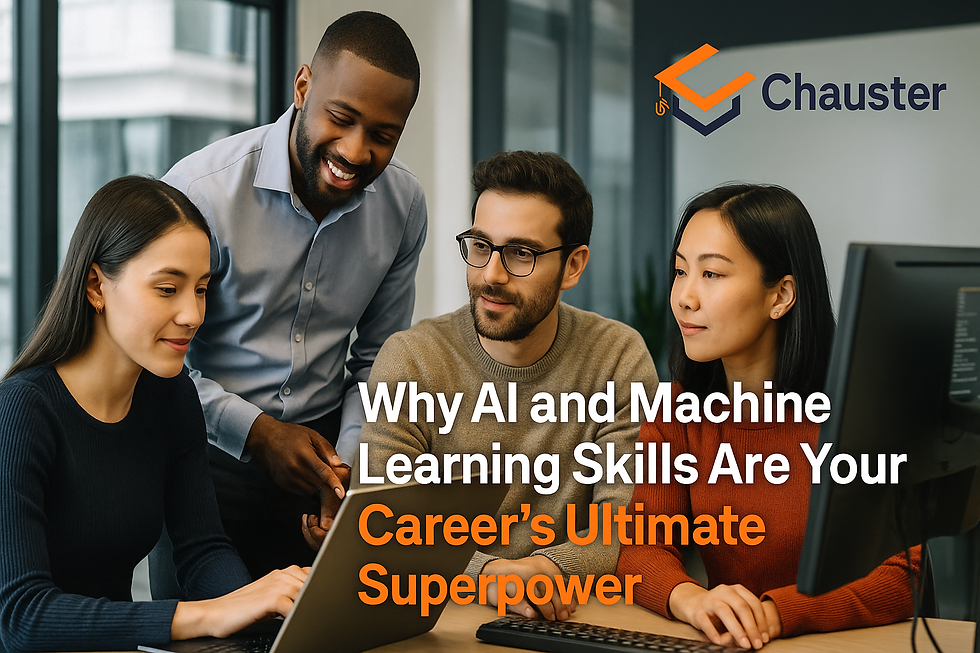02-04 AI Transforming Key Industries
- Steve Chau

- Feb 22
- 4 min read
Updated: Mar 22
How AI is Transforming Healthcare, Finance, Manufacturing, and Transportation
Artificial Intelligence (AI) is revolutionizing industries by introducing highly automated processes, data-driven insights, and enhanced decision-making capabilities. As a result, businesses and organizations across various sectors are experiencing increased efficiency, accuracy, and personalized experiences. AI has become a driving force behind digital transformation, enabling industries to leverage vast amounts of data for predictive analysis, process automation, and strategic planning. From streamlining workflows to reducing operational costs, AI shapes how businesses operate in an increasingly technology-driven world.
AI's capabilities significantly improved the healthcare, finance, manufacturing, and transportation industries. AI enhances patient care and medical research by providing rapid diagnostics and precision treatments. AI-driven solutions offer advanced fraud detection and risk assessment in finance, strengthening financial security—manufacturing benefits from AI's automation and predictive maintenance, optimizing efficiency and minimizing downtime. In transportation, AI revolutionizes traffic management and logistics, making mobility safer and more efficient. This article explores AI's profound impact on these sectors and potential future advancements it may bring.

AI in Healthcare
AI significantly improves healthcare by aiding diagnosis, treatment planning, and research. The integration of AI in healthcare has revolutionized patient care by providing faster, more accurate diagnostics, reducing human error, and streamlining administrative tasks. With AI-driven advancements, medical professionals can leverage vast datasets to identify diseases early, personalize treatment plans, and improve patient outcomes.
Diagnosis and Imaging Analysis:
AI algorithms analyze medical images, such as X-rays, MRIs, and CT scans, to assist doctors in detecting diseases and abnormalities with greater accuracy and speed.
Drug Discovery:
AI can analyze vast datasets to identify potential drug targets and predict their efficacy, accelerating drug development.
Personalized Medicine:
AI can create customized treatment plans tailored to individual needs and medical history by analyzing patient data.
Clinical Decision Support:
AI-powered systems can provide real-time insights and recommendations to healthcare providers during patient consultations, aiding decision-making.

AI in Finance
The finance industry has embraced AI to improve efficiency, enhance security, and optimize decision-making. Financial institutions use AI to quickly process large volumes of data, identify trends, and automate various processes, such as risk assessment and fraud detection. AI-driven solutions have improved transaction security, personalized financial services, and enhanced customer experiences by providing real-time assistance.
Fraud Detection:
AI algorithms can identify fraudulent transactions in real time by analyzing complex patterns in financial data.
Risk Assessment:
AI can assess creditworthiness and investment risks more accurately by analyzing large datasets of customer information.
Algorithmic Trading:
AI-powered trading systems can execute trades based on market data analysis, potentially generating higher returns and optimizing portfolio management.
Customer Service Chatbots:
AI-driven chatbots can handle customer inquiries and provide support on financial products and services 24/7.

AI in Manufacturing
AI has transformed manufacturing through automation, predictive maintenance, and quality control. It has enabled smart manufacturing by streamlining production processes, improving product quality, and reducing operational costs. Advanced AI systems can predict machine failures, optimize material usage, and enhance supply chain efficiency, increasing productivity and reducing waste.
Predictive Maintenance:
AI can analyze sensor data from machinery to predict equipment failures, allowing for preventative maintenance and reducing downtime.
Production Optimization:
AI algorithms can optimize production processes by adjusting parameters like material usage and machine settings to maximize efficiency.
Quality Control:
AI can inspect products on the manufacturing line, identifying defects in real time to ensure quality standards are met.
Supply Chain Management:
AI can analyze supply chain data to predict demand, optimize inventory levels, and improve logistics planning.

AI in Transportation
The transportation industry is transforming significantly with AI-driven innovations in traffic management, logistics, and autonomous vehicles. AI-powered systems have improved transportation safety, efficiency, and sustainability by optimizing routes, reducing congestion, and predicting travel demands. From self-driving cars to intelligent traffic control systems, AI is shaping the future of mobility.
Traffic Management:
AI can analyze real-time traffic patterns to optimize traffic signal timings and suggest alternative routes, reducing congestion.
Autonomous Vehicles:
AI powers self-driving cars by processing sensor data to navigate roads, detect obstacles, and make driving decisions.
Route Optimization:
AI algorithms can calculate the most efficient routes for delivery vehicles based on real-time traffic conditions, minimizing travel time and fuel consumption.
Demand Forecasting:
AI can analyze historical data to predict passenger demand, allowing transportation companies to optimize fleet size and scheduling.

Conclusion
AI is revolutionizing key industries by enabling automation, enhancing efficiency, and improving decision-making. AI enhances diagnostics, drug discovery, and personalized treatment plans in healthcare. In finance, it bolsters fraud detection, risk assessment, and algorithmic trading. AI optimizes production, predicts equipment failures, and improves quality control in manufacturing. Lastly, AI streamlines traffic management optimizes logistics and advances autonomous vehicle technology in transportation.
As AI technology advances, its potential to drive further innovations is limitless. Emerging trends such as AI-driven robotics, enhanced natural language processing, and edge computing will further refine AI's role in different industries. The ethical and regulatory challenges surrounding AI adoption will also shape how it is integrated into daily operations. The continuous evolution of AI promises a future where industries become more intelligent, interconnected, and efficient, ultimately transforming how society functions globally.














Comments